Quality Management Practices and Sustainable Performance Report
VerifiedAdded on 2023/01/07
|18
|6144
|70
Report
AI Summary
This report delves into the realm of quality management within the context of operational management. It begins by defining total quality management and its emphasis on continuous improvement and customer satisfaction. The main body explores four key quality practices: top management commitment, employee involvement, customer relations, and supplier management. It then examines quality management systems, including ISO 9000, and quality models and awards such as EFQM and the Deming Prize. A literature review supports the analysis, discussing the importance of top management commitment and employee involvement. The report further analyzes the impact of these practices on sustainable performance, covering financial, customer, and internal process perspectives. The report emphasizes the importance of maintaining quality for increasing customer satisfaction and reducing cost. The report concludes by summarizing the key findings, underscoring the crucial role of quality management in achieving organizational goals and sustainable performance.
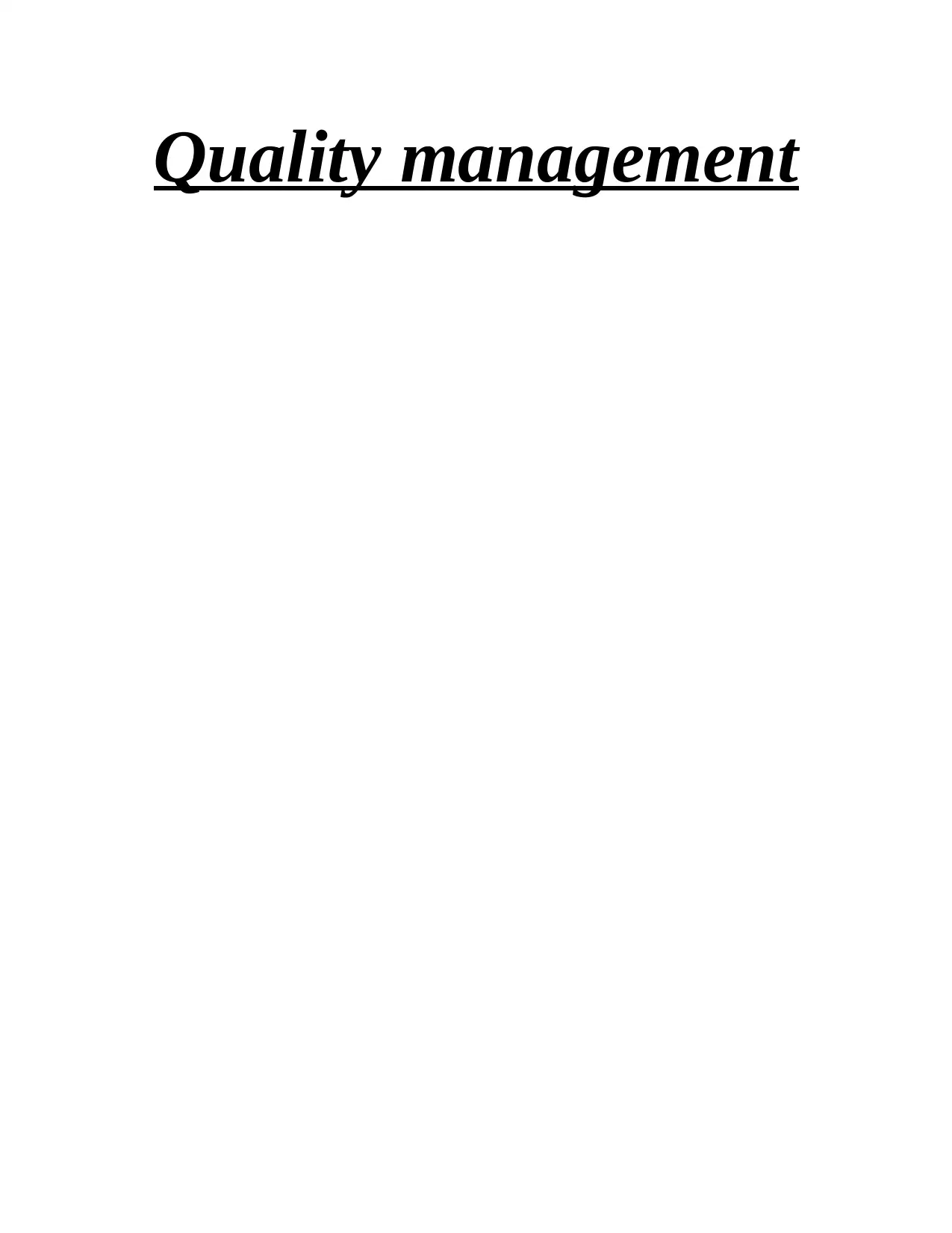
Quality management
Paraphrase This Document
Need a fresh take? Get an instant paraphrase of this document with our AI Paraphraser
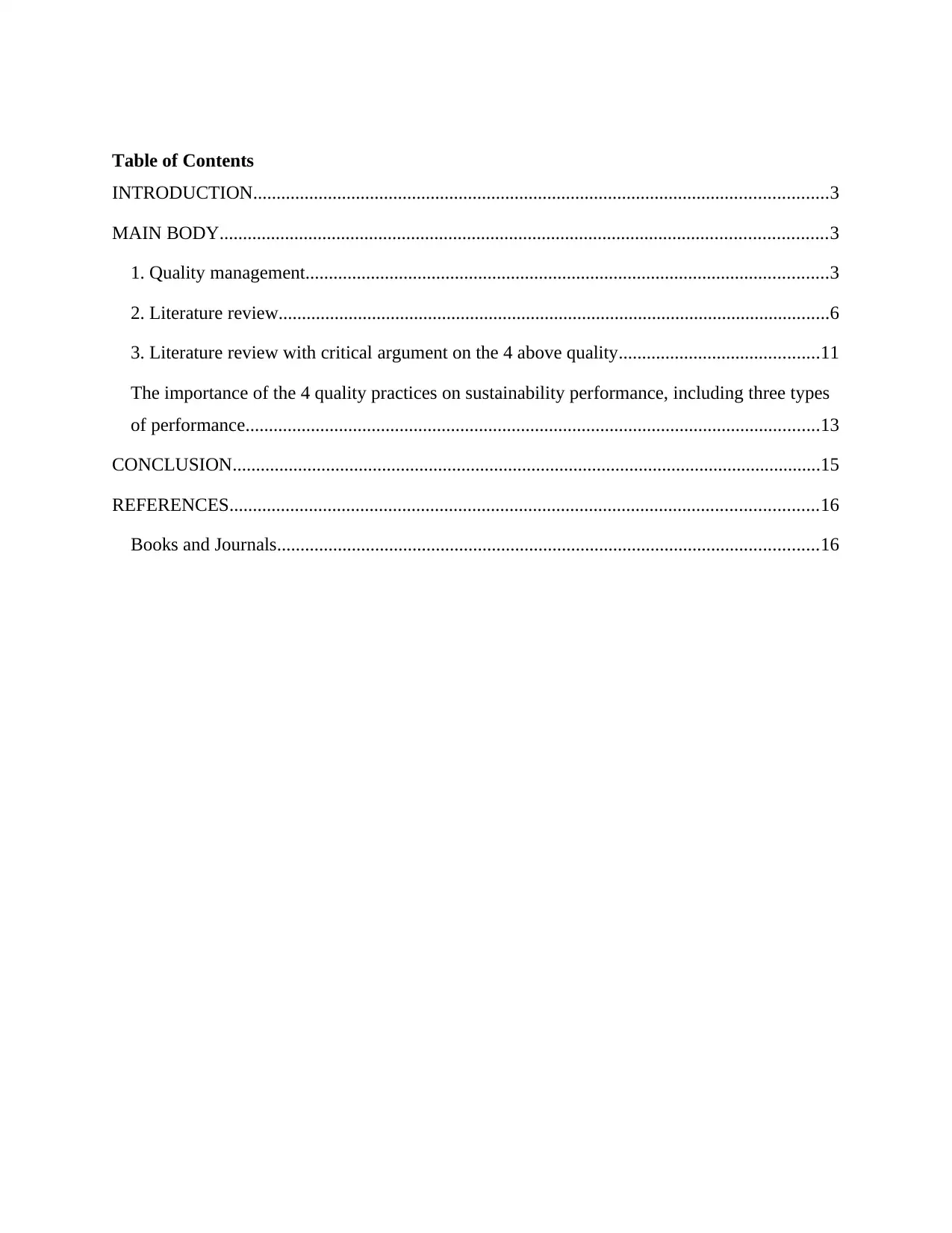
Table of Contents
INTRODUCTION...........................................................................................................................3
MAIN BODY..................................................................................................................................3
1. Quality management................................................................................................................3
2. Literature review......................................................................................................................6
3. Literature review with critical argument on the 4 above quality...........................................11
The importance of the 4 quality practices on sustainability performance, including three types
of performance...........................................................................................................................13
CONCLUSION..............................................................................................................................15
REFERENCES..............................................................................................................................16
Books and Journals....................................................................................................................16
INTRODUCTION...........................................................................................................................3
MAIN BODY..................................................................................................................................3
1. Quality management................................................................................................................3
2. Literature review......................................................................................................................6
3. Literature review with critical argument on the 4 above quality...........................................11
The importance of the 4 quality practices on sustainability performance, including three types
of performance...........................................................................................................................13
CONCLUSION..............................................................................................................................15
REFERENCES..............................................................................................................................16
Books and Journals....................................................................................................................16
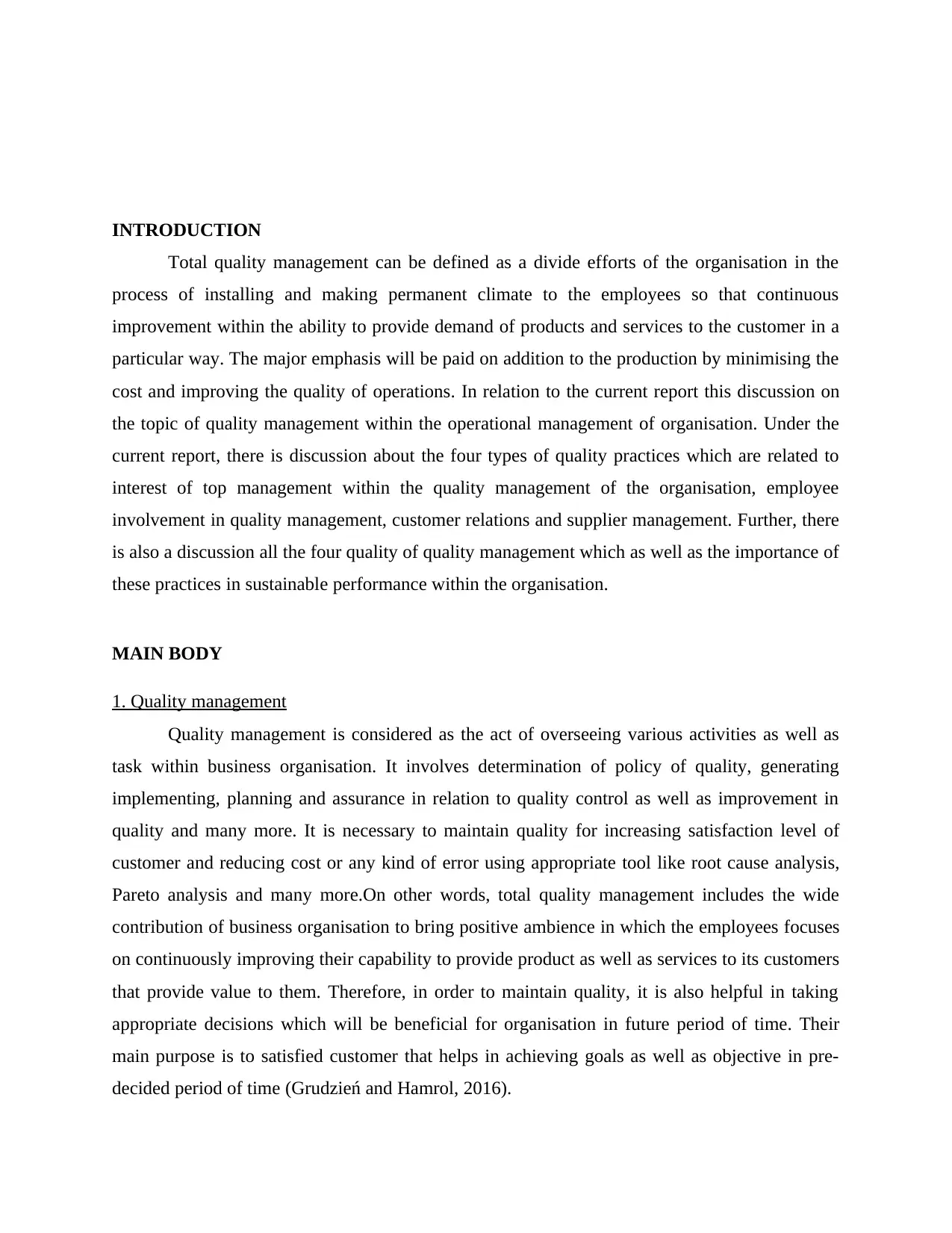
INTRODUCTION
Total quality management can be defined as a divide efforts of the organisation in the
process of installing and making permanent climate to the employees so that continuous
improvement within the ability to provide demand of products and services to the customer in a
particular way. The major emphasis will be paid on addition to the production by minimising the
cost and improving the quality of operations. In relation to the current report this discussion on
the topic of quality management within the operational management of organisation. Under the
current report, there is discussion about the four types of quality practices which are related to
interest of top management within the quality management of the organisation, employee
involvement in quality management, customer relations and supplier management. Further, there
is also a discussion all the four quality of quality management which as well as the importance of
these practices in sustainable performance within the organisation.
MAIN BODY
1. Quality management
Quality management is considered as the act of overseeing various activities as well as
task within business organisation. It involves determination of policy of quality, generating
implementing, planning and assurance in relation to quality control as well as improvement in
quality and many more. It is necessary to maintain quality for increasing satisfaction level of
customer and reducing cost or any kind of error using appropriate tool like root cause analysis,
Pareto analysis and many more.On other words, total quality management includes the wide
contribution of business organisation to bring positive ambience in which the employees focuses
on continuously improving their capability to provide product as well as services to its customers
that provide value to them. Therefore, in order to maintain quality, it is also helpful in taking
appropriate decisions which will be beneficial for organisation in future period of time. Their
main purpose is to satisfied customer that helps in achieving goals as well as objective in pre-
decided period of time (Grudzień and Hamrol, 2016).
Total quality management can be defined as a divide efforts of the organisation in the
process of installing and making permanent climate to the employees so that continuous
improvement within the ability to provide demand of products and services to the customer in a
particular way. The major emphasis will be paid on addition to the production by minimising the
cost and improving the quality of operations. In relation to the current report this discussion on
the topic of quality management within the operational management of organisation. Under the
current report, there is discussion about the four types of quality practices which are related to
interest of top management within the quality management of the organisation, employee
involvement in quality management, customer relations and supplier management. Further, there
is also a discussion all the four quality of quality management which as well as the importance of
these practices in sustainable performance within the organisation.
MAIN BODY
1. Quality management
Quality management is considered as the act of overseeing various activities as well as
task within business organisation. It involves determination of policy of quality, generating
implementing, planning and assurance in relation to quality control as well as improvement in
quality and many more. It is necessary to maintain quality for increasing satisfaction level of
customer and reducing cost or any kind of error using appropriate tool like root cause analysis,
Pareto analysis and many more.On other words, total quality management includes the wide
contribution of business organisation to bring positive ambience in which the employees focuses
on continuously improving their capability to provide product as well as services to its customers
that provide value to them. Therefore, in order to maintain quality, it is also helpful in taking
appropriate decisions which will be beneficial for organisation in future period of time. Their
main purpose is to satisfied customer that helps in achieving goals as well as objective in pre-
decided period of time (Grudzień and Hamrol, 2016).
⊘ This is a preview!⊘
Do you want full access?
Subscribe today to unlock all pages.

Trusted by 1+ million students worldwide
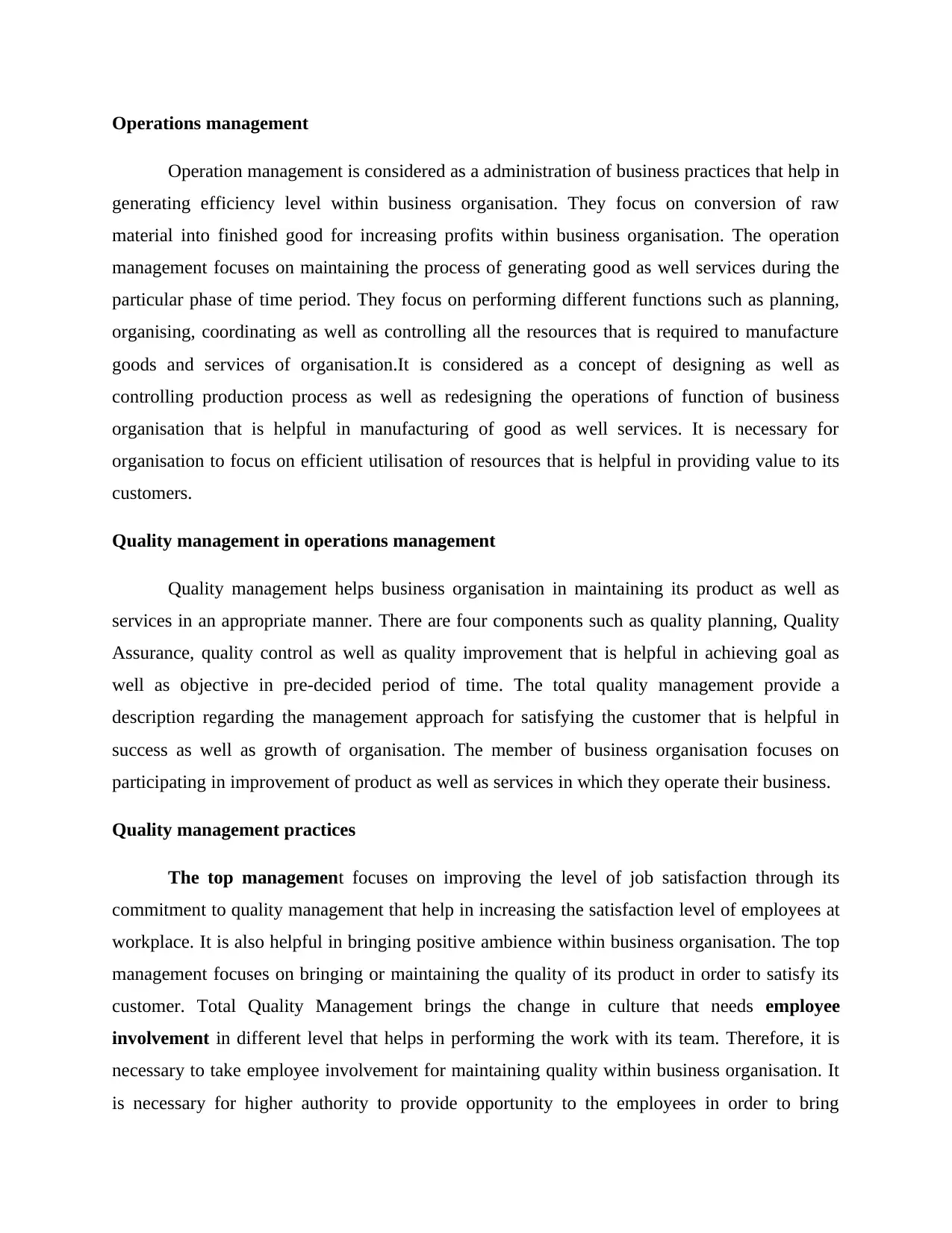
Operations management
Operation management is considered as a administration of business practices that help in
generating efficiency level within business organisation. They focus on conversion of raw
material into finished good for increasing profits within business organisation. The operation
management focuses on maintaining the process of generating good as well services during the
particular phase of time period. They focus on performing different functions such as planning,
organising, coordinating as well as controlling all the resources that is required to manufacture
goods and services of organisation.It is considered as a concept of designing as well as
controlling production process as well as redesigning the operations of function of business
organisation that is helpful in manufacturing of good as well services. It is necessary for
organisation to focus on efficient utilisation of resources that is helpful in providing value to its
customers.
Quality management in operations management
Quality management helps business organisation in maintaining its product as well as
services in an appropriate manner. There are four components such as quality planning, Quality
Assurance, quality control as well as quality improvement that is helpful in achieving goal as
well as objective in pre-decided period of time. The total quality management provide a
description regarding the management approach for satisfying the customer that is helpful in
success as well as growth of organisation. The member of business organisation focuses on
participating in improvement of product as well as services in which they operate their business.
Quality management practices
The top management focuses on improving the level of job satisfaction through its
commitment to quality management that help in increasing the satisfaction level of employees at
workplace. It is also helpful in bringing positive ambience within business organisation. The top
management focuses on bringing or maintaining the quality of its product in order to satisfy its
customer. Total Quality Management brings the change in culture that needs employee
involvement in different level that helps in performing the work with its team. Therefore, it is
necessary to take employee involvement for maintaining quality within business organisation. It
is necessary for higher authority to provide opportunity to the employees in order to bring
Operation management is considered as a administration of business practices that help in
generating efficiency level within business organisation. They focus on conversion of raw
material into finished good for increasing profits within business organisation. The operation
management focuses on maintaining the process of generating good as well services during the
particular phase of time period. They focus on performing different functions such as planning,
organising, coordinating as well as controlling all the resources that is required to manufacture
goods and services of organisation.It is considered as a concept of designing as well as
controlling production process as well as redesigning the operations of function of business
organisation that is helpful in manufacturing of good as well services. It is necessary for
organisation to focus on efficient utilisation of resources that is helpful in providing value to its
customers.
Quality management in operations management
Quality management helps business organisation in maintaining its product as well as
services in an appropriate manner. There are four components such as quality planning, Quality
Assurance, quality control as well as quality improvement that is helpful in achieving goal as
well as objective in pre-decided period of time. The total quality management provide a
description regarding the management approach for satisfying the customer that is helpful in
success as well as growth of organisation. The member of business organisation focuses on
participating in improvement of product as well as services in which they operate their business.
Quality management practices
The top management focuses on improving the level of job satisfaction through its
commitment to quality management that help in increasing the satisfaction level of employees at
workplace. It is also helpful in bringing positive ambience within business organisation. The top
management focuses on bringing or maintaining the quality of its product in order to satisfy its
customer. Total Quality Management brings the change in culture that needs employee
involvement in different level that helps in performing the work with its team. Therefore, it is
necessary to take employee involvement for maintaining quality within business organisation. It
is necessary for higher authority to provide opportunity to the employees in order to bring
Paraphrase This Document
Need a fresh take? Get an instant paraphrase of this document with our AI Paraphraser
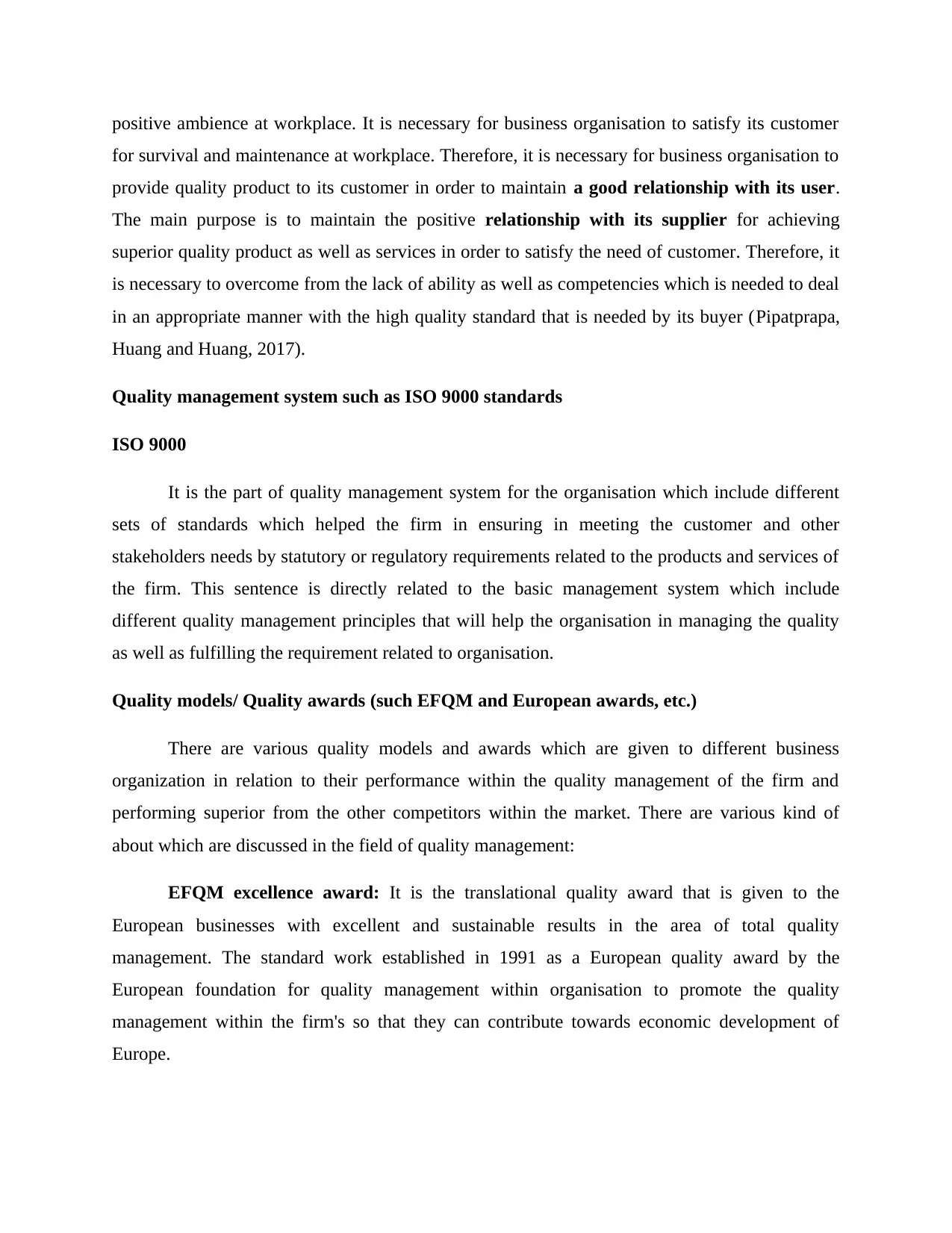
positive ambience at workplace. It is necessary for business organisation to satisfy its customer
for survival and maintenance at workplace. Therefore, it is necessary for business organisation to
provide quality product to its customer in order to maintain a good relationship with its user.
The main purpose is to maintain the positive relationship with its supplier for achieving
superior quality product as well as services in order to satisfy the need of customer. Therefore, it
is necessary to overcome from the lack of ability as well as competencies which is needed to deal
in an appropriate manner with the high quality standard that is needed by its buyer (Pipatprapa,
Huang and Huang, 2017).
Quality management system such as ISO 9000 standards
ISO 9000
It is the part of quality management system for the organisation which include different
sets of standards which helped the firm in ensuring in meeting the customer and other
stakeholders needs by statutory or regulatory requirements related to the products and services of
the firm. This sentence is directly related to the basic management system which include
different quality management principles that will help the organisation in managing the quality
as well as fulfilling the requirement related to organisation.
Quality models/ Quality awards (such EFQM and European awards, etc.)
There are various quality models and awards which are given to different business
organization in relation to their performance within the quality management of the firm and
performing superior from the other competitors within the market. There are various kind of
about which are discussed in the field of quality management:
EFQM excellence award: It is the translational quality award that is given to the
European businesses with excellent and sustainable results in the area of total quality
management. The standard work established in 1991 as a European quality award by the
European foundation for quality management within organisation to promote the quality
management within the firm's so that they can contribute towards economic development of
Europe.
for survival and maintenance at workplace. Therefore, it is necessary for business organisation to
provide quality product to its customer in order to maintain a good relationship with its user.
The main purpose is to maintain the positive relationship with its supplier for achieving
superior quality product as well as services in order to satisfy the need of customer. Therefore, it
is necessary to overcome from the lack of ability as well as competencies which is needed to deal
in an appropriate manner with the high quality standard that is needed by its buyer (Pipatprapa,
Huang and Huang, 2017).
Quality management system such as ISO 9000 standards
ISO 9000
It is the part of quality management system for the organisation which include different
sets of standards which helped the firm in ensuring in meeting the customer and other
stakeholders needs by statutory or regulatory requirements related to the products and services of
the firm. This sentence is directly related to the basic management system which include
different quality management principles that will help the organisation in managing the quality
as well as fulfilling the requirement related to organisation.
Quality models/ Quality awards (such EFQM and European awards, etc.)
There are various quality models and awards which are given to different business
organization in relation to their performance within the quality management of the firm and
performing superior from the other competitors within the market. There are various kind of
about which are discussed in the field of quality management:
EFQM excellence award: It is the translational quality award that is given to the
European businesses with excellent and sustainable results in the area of total quality
management. The standard work established in 1991 as a European quality award by the
European foundation for quality management within organisation to promote the quality
management within the firm's so that they can contribute towards economic development of
Europe.
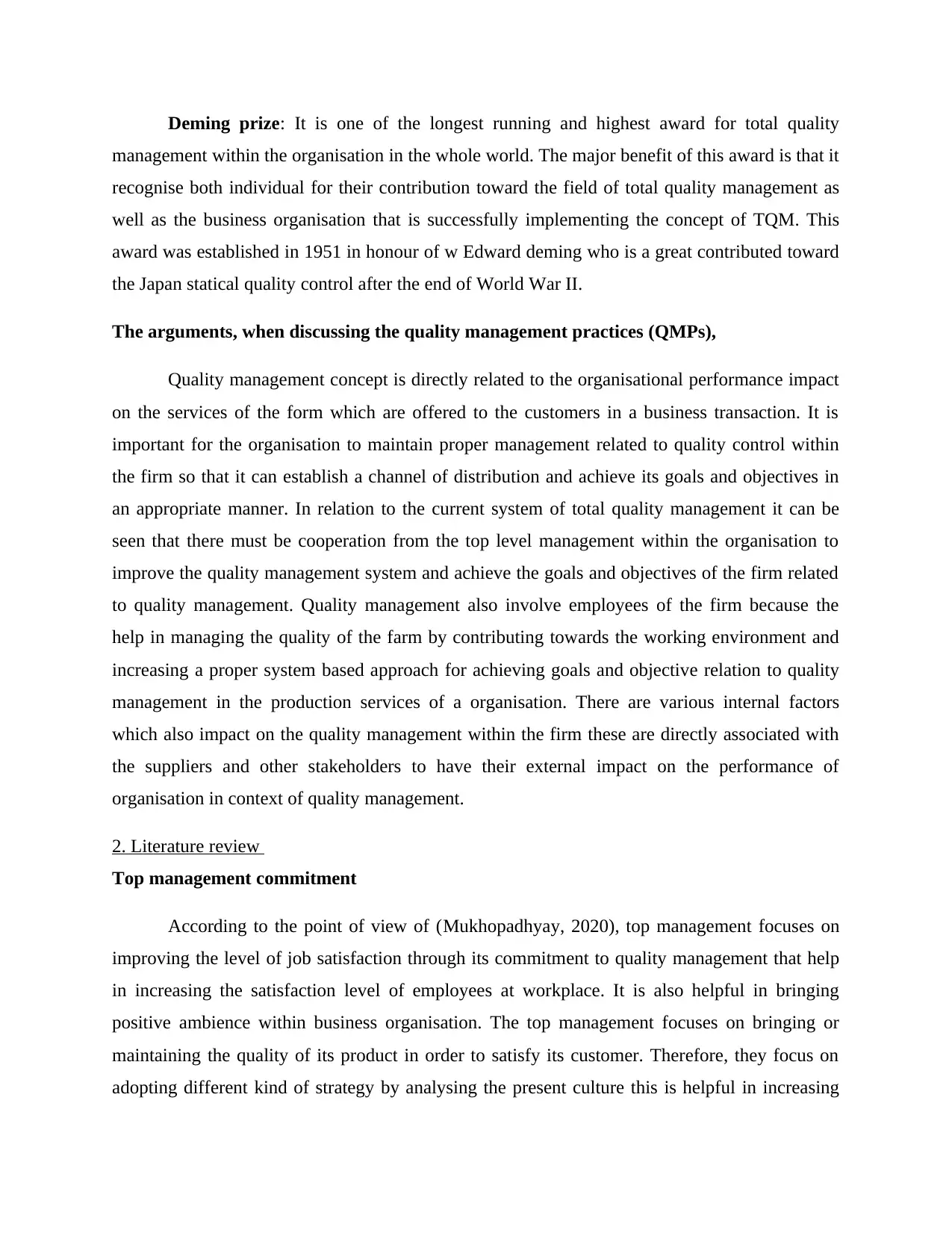
Deming prize: It is one of the longest running and highest award for total quality
management within the organisation in the whole world. The major benefit of this award is that it
recognise both individual for their contribution toward the field of total quality management as
well as the business organisation that is successfully implementing the concept of TQM. This
award was established in 1951 in honour of w Edward deming who is a great contributed toward
the Japan statical quality control after the end of World War II.
The arguments, when discussing the quality management practices (QMPs),
Quality management concept is directly related to the organisational performance impact
on the services of the form which are offered to the customers in a business transaction. It is
important for the organisation to maintain proper management related to quality control within
the firm so that it can establish a channel of distribution and achieve its goals and objectives in
an appropriate manner. In relation to the current system of total quality management it can be
seen that there must be cooperation from the top level management within the organisation to
improve the quality management system and achieve the goals and objectives of the firm related
to quality management. Quality management also involve employees of the firm because the
help in managing the quality of the farm by contributing towards the working environment and
increasing a proper system based approach for achieving goals and objective relation to quality
management in the production services of a organisation. There are various internal factors
which also impact on the quality management within the firm these are directly associated with
the suppliers and other stakeholders to have their external impact on the performance of
organisation in context of quality management.
2. Literature review
Top management commitment
According to the point of view of (Mukhopadhyay, 2020), top management focuses on
improving the level of job satisfaction through its commitment to quality management that help
in increasing the satisfaction level of employees at workplace. It is also helpful in bringing
positive ambience within business organisation. The top management focuses on bringing or
maintaining the quality of its product in order to satisfy its customer. Therefore, they focus on
adopting different kind of strategy by analysing the present culture this is helpful in increasing
management within the organisation in the whole world. The major benefit of this award is that it
recognise both individual for their contribution toward the field of total quality management as
well as the business organisation that is successfully implementing the concept of TQM. This
award was established in 1951 in honour of w Edward deming who is a great contributed toward
the Japan statical quality control after the end of World War II.
The arguments, when discussing the quality management practices (QMPs),
Quality management concept is directly related to the organisational performance impact
on the services of the form which are offered to the customers in a business transaction. It is
important for the organisation to maintain proper management related to quality control within
the firm so that it can establish a channel of distribution and achieve its goals and objectives in
an appropriate manner. In relation to the current system of total quality management it can be
seen that there must be cooperation from the top level management within the organisation to
improve the quality management system and achieve the goals and objectives of the firm related
to quality management. Quality management also involve employees of the firm because the
help in managing the quality of the farm by contributing towards the working environment and
increasing a proper system based approach for achieving goals and objective relation to quality
management in the production services of a organisation. There are various internal factors
which also impact on the quality management within the firm these are directly associated with
the suppliers and other stakeholders to have their external impact on the performance of
organisation in context of quality management.
2. Literature review
Top management commitment
According to the point of view of (Mukhopadhyay, 2020), top management focuses on
improving the level of job satisfaction through its commitment to quality management that help
in increasing the satisfaction level of employees at workplace. It is also helpful in bringing
positive ambience within business organisation. The top management focuses on bringing or
maintaining the quality of its product in order to satisfy its customer. Therefore, they focus on
adopting different kind of strategy by analysing the present culture this is helpful in increasing
⊘ This is a preview!⊘
Do you want full access?
Subscribe today to unlock all pages.

Trusted by 1+ million students worldwide
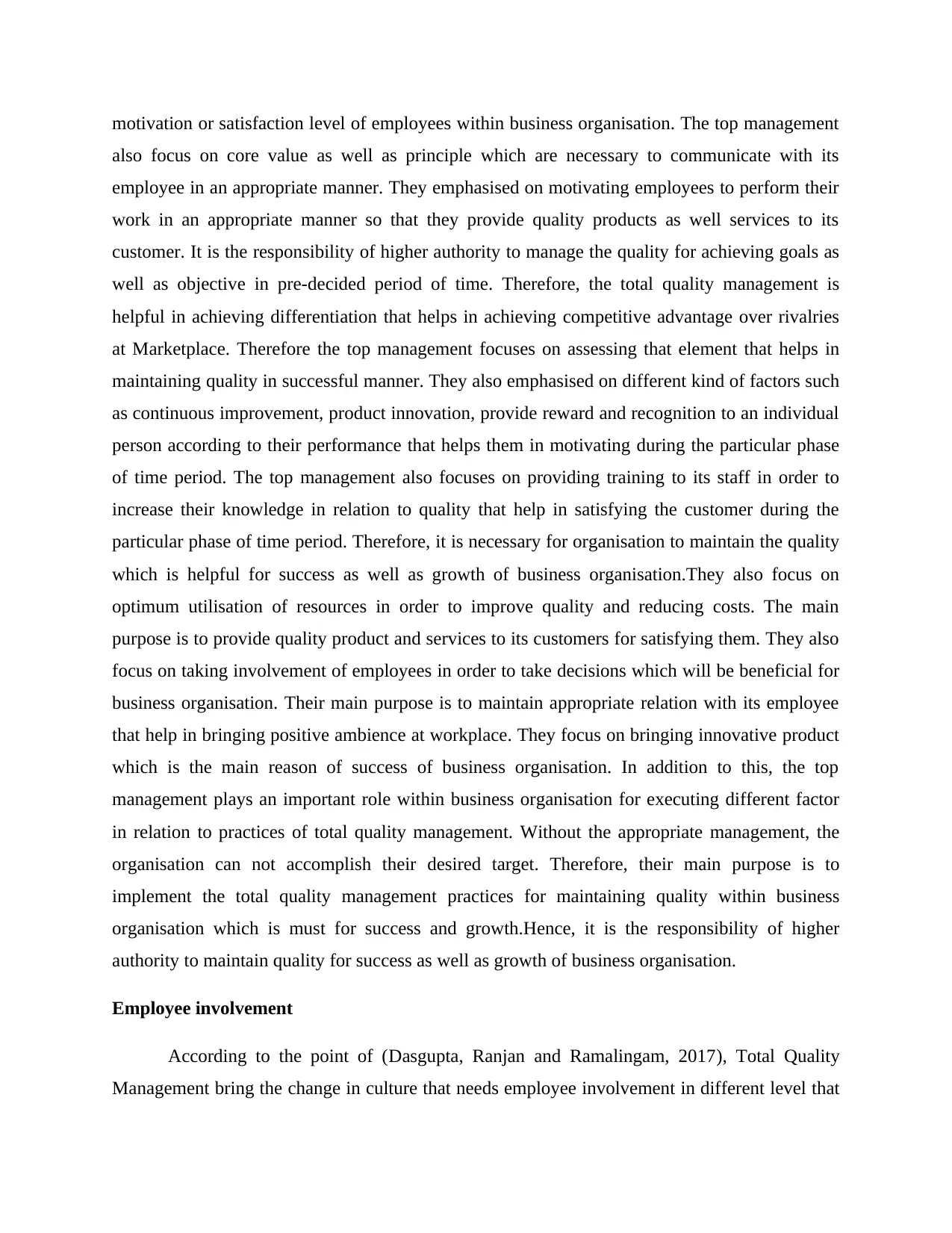
motivation or satisfaction level of employees within business organisation. The top management
also focus on core value as well as principle which are necessary to communicate with its
employee in an appropriate manner. They emphasised on motivating employees to perform their
work in an appropriate manner so that they provide quality products as well services to its
customer. It is the responsibility of higher authority to manage the quality for achieving goals as
well as objective in pre-decided period of time. Therefore, the total quality management is
helpful in achieving differentiation that helps in achieving competitive advantage over rivalries
at Marketplace. Therefore the top management focuses on assessing that element that helps in
maintaining quality in successful manner. They also emphasised on different kind of factors such
as continuous improvement, product innovation, provide reward and recognition to an individual
person according to their performance that helps them in motivating during the particular phase
of time period. The top management also focuses on providing training to its staff in order to
increase their knowledge in relation to quality that help in satisfying the customer during the
particular phase of time period. Therefore, it is necessary for organisation to maintain the quality
which is helpful for success as well as growth of business organisation.They also focus on
optimum utilisation of resources in order to improve quality and reducing costs. The main
purpose is to provide quality product and services to its customers for satisfying them. They also
focus on taking involvement of employees in order to take decisions which will be beneficial for
business organisation. Their main purpose is to maintain appropriate relation with its employee
that help in bringing positive ambience at workplace. They focus on bringing innovative product
which is the main reason of success of business organisation. In addition to this, the top
management plays an important role within business organisation for executing different factor
in relation to practices of total quality management. Without the appropriate management, the
organisation can not accomplish their desired target. Therefore, their main purpose is to
implement the total quality management practices for maintaining quality within business
organisation which is must for success and growth.Hence, it is the responsibility of higher
authority to maintain quality for success as well as growth of business organisation.
Employee involvement
According to the point of (Dasgupta, Ranjan and Ramalingam, 2017), Total Quality
Management bring the change in culture that needs employee involvement in different level that
also focus on core value as well as principle which are necessary to communicate with its
employee in an appropriate manner. They emphasised on motivating employees to perform their
work in an appropriate manner so that they provide quality products as well services to its
customer. It is the responsibility of higher authority to manage the quality for achieving goals as
well as objective in pre-decided period of time. Therefore, the total quality management is
helpful in achieving differentiation that helps in achieving competitive advantage over rivalries
at Marketplace. Therefore the top management focuses on assessing that element that helps in
maintaining quality in successful manner. They also emphasised on different kind of factors such
as continuous improvement, product innovation, provide reward and recognition to an individual
person according to their performance that helps them in motivating during the particular phase
of time period. The top management also focuses on providing training to its staff in order to
increase their knowledge in relation to quality that help in satisfying the customer during the
particular phase of time period. Therefore, it is necessary for organisation to maintain the quality
which is helpful for success as well as growth of business organisation.They also focus on
optimum utilisation of resources in order to improve quality and reducing costs. The main
purpose is to provide quality product and services to its customers for satisfying them. They also
focus on taking involvement of employees in order to take decisions which will be beneficial for
business organisation. Their main purpose is to maintain appropriate relation with its employee
that help in bringing positive ambience at workplace. They focus on bringing innovative product
which is the main reason of success of business organisation. In addition to this, the top
management plays an important role within business organisation for executing different factor
in relation to practices of total quality management. Without the appropriate management, the
organisation can not accomplish their desired target. Therefore, their main purpose is to
implement the total quality management practices for maintaining quality within business
organisation which is must for success and growth.Hence, it is the responsibility of higher
authority to maintain quality for success as well as growth of business organisation.
Employee involvement
According to the point of (Dasgupta, Ranjan and Ramalingam, 2017), Total Quality
Management bring the change in culture that needs employee involvement in different level that
Paraphrase This Document
Need a fresh take? Get an instant paraphrase of this document with our AI Paraphraser
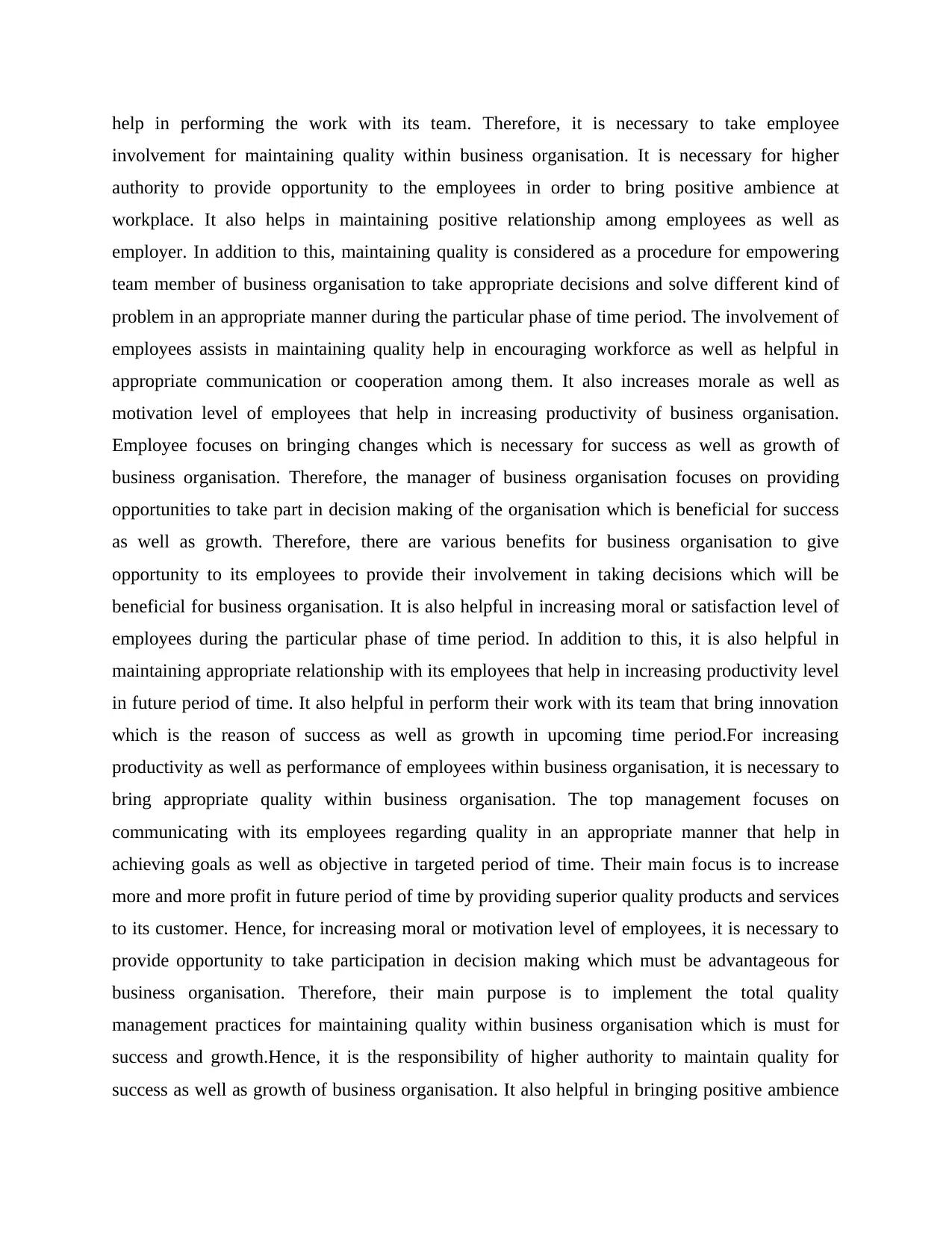
help in performing the work with its team. Therefore, it is necessary to take employee
involvement for maintaining quality within business organisation. It is necessary for higher
authority to provide opportunity to the employees in order to bring positive ambience at
workplace. It also helps in maintaining positive relationship among employees as well as
employer. In addition to this, maintaining quality is considered as a procedure for empowering
team member of business organisation to take appropriate decisions and solve different kind of
problem in an appropriate manner during the particular phase of time period. The involvement of
employees assists in maintaining quality help in encouraging workforce as well as helpful in
appropriate communication or cooperation among them. It also increases morale as well as
motivation level of employees that help in increasing productivity of business organisation.
Employee focuses on bringing changes which is necessary for success as well as growth of
business organisation. Therefore, the manager of business organisation focuses on providing
opportunities to take part in decision making of the organisation which is beneficial for success
as well as growth. Therefore, there are various benefits for business organisation to give
opportunity to its employees to provide their involvement in taking decisions which will be
beneficial for business organisation. It is also helpful in increasing moral or satisfaction level of
employees during the particular phase of time period. In addition to this, it is also helpful in
maintaining appropriate relationship with its employees that help in increasing productivity level
in future period of time. It also helpful in perform their work with its team that bring innovation
which is the reason of success as well as growth in upcoming time period.For increasing
productivity as well as performance of employees within business organisation, it is necessary to
bring appropriate quality within business organisation. The top management focuses on
communicating with its employees regarding quality in an appropriate manner that help in
achieving goals as well as objective in targeted period of time. Their main focus is to increase
more and more profit in future period of time by providing superior quality products and services
to its customer. Hence, for increasing moral or motivation level of employees, it is necessary to
provide opportunity to take participation in decision making which must be advantageous for
business organisation. Therefore, their main purpose is to implement the total quality
management practices for maintaining quality within business organisation which is must for
success and growth.Hence, it is the responsibility of higher authority to maintain quality for
success as well as growth of business organisation. It also helpful in bringing positive ambience
involvement for maintaining quality within business organisation. It is necessary for higher
authority to provide opportunity to the employees in order to bring positive ambience at
workplace. It also helps in maintaining positive relationship among employees as well as
employer. In addition to this, maintaining quality is considered as a procedure for empowering
team member of business organisation to take appropriate decisions and solve different kind of
problem in an appropriate manner during the particular phase of time period. The involvement of
employees assists in maintaining quality help in encouraging workforce as well as helpful in
appropriate communication or cooperation among them. It also increases morale as well as
motivation level of employees that help in increasing productivity of business organisation.
Employee focuses on bringing changes which is necessary for success as well as growth of
business organisation. Therefore, the manager of business organisation focuses on providing
opportunities to take part in decision making of the organisation which is beneficial for success
as well as growth. Therefore, there are various benefits for business organisation to give
opportunity to its employees to provide their involvement in taking decisions which will be
beneficial for business organisation. It is also helpful in increasing moral or satisfaction level of
employees during the particular phase of time period. In addition to this, it is also helpful in
maintaining appropriate relationship with its employees that help in increasing productivity level
in future period of time. It also helpful in perform their work with its team that bring innovation
which is the reason of success as well as growth in upcoming time period.For increasing
productivity as well as performance of employees within business organisation, it is necessary to
bring appropriate quality within business organisation. The top management focuses on
communicating with its employees regarding quality in an appropriate manner that help in
achieving goals as well as objective in targeted period of time. Their main focus is to increase
more and more profit in future period of time by providing superior quality products and services
to its customer. Hence, for increasing moral or motivation level of employees, it is necessary to
provide opportunity to take participation in decision making which must be advantageous for
business organisation. Therefore, their main purpose is to implement the total quality
management practices for maintaining quality within business organisation which is must for
success and growth.Hence, it is the responsibility of higher authority to maintain quality for
success as well as growth of business organisation. It also helpful in bringing positive ambience
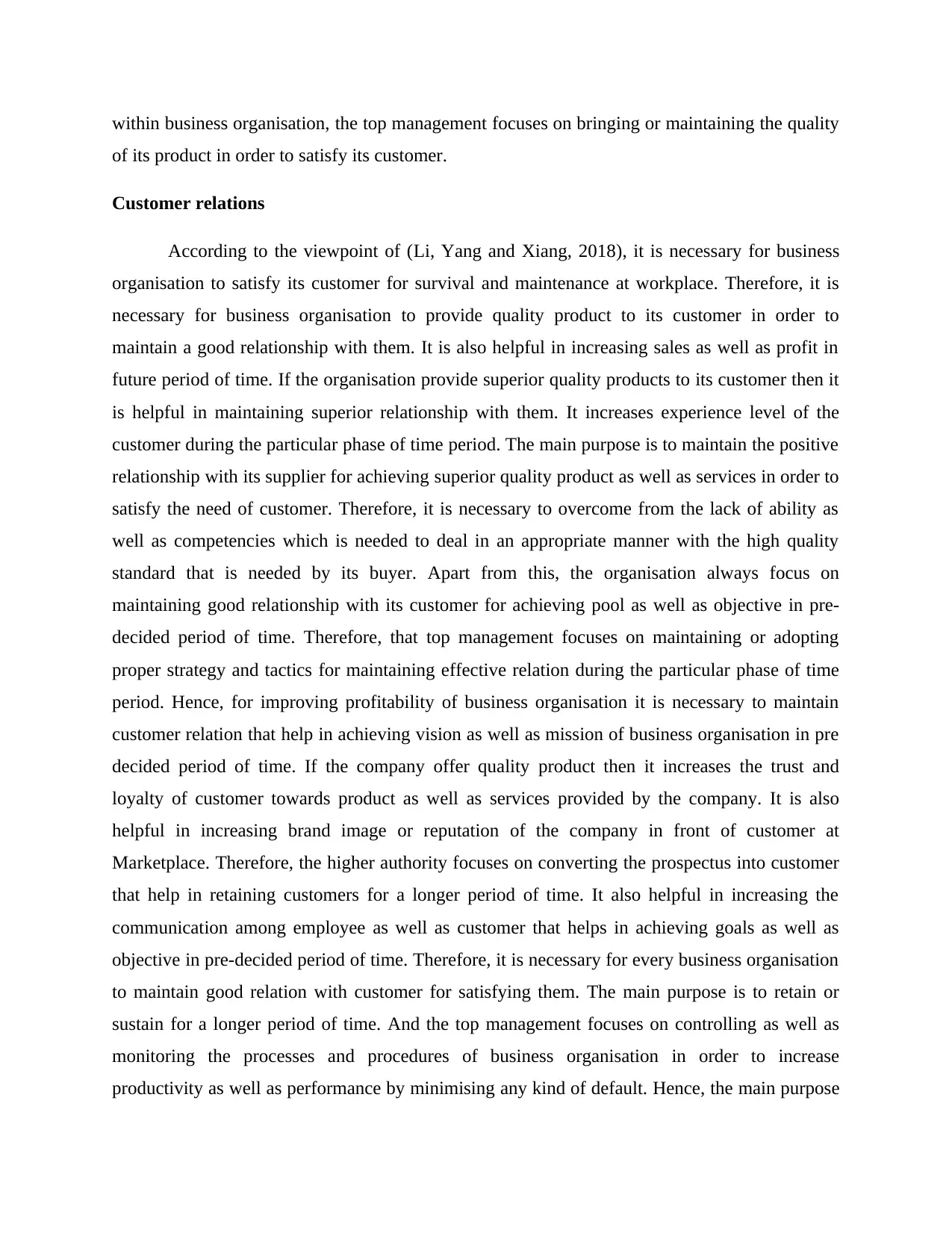
within business organisation, the top management focuses on bringing or maintaining the quality
of its product in order to satisfy its customer.
Customer relations
According to the viewpoint of (Li, Yang and Xiang, 2018), it is necessary for business
organisation to satisfy its customer for survival and maintenance at workplace. Therefore, it is
necessary for business organisation to provide quality product to its customer in order to
maintain a good relationship with them. It is also helpful in increasing sales as well as profit in
future period of time. If the organisation provide superior quality products to its customer then it
is helpful in maintaining superior relationship with them. It increases experience level of the
customer during the particular phase of time period. The main purpose is to maintain the positive
relationship with its supplier for achieving superior quality product as well as services in order to
satisfy the need of customer. Therefore, it is necessary to overcome from the lack of ability as
well as competencies which is needed to deal in an appropriate manner with the high quality
standard that is needed by its buyer. Apart from this, the organisation always focus on
maintaining good relationship with its customer for achieving pool as well as objective in pre-
decided period of time. Therefore, that top management focuses on maintaining or adopting
proper strategy and tactics for maintaining effective relation during the particular phase of time
period. Hence, for improving profitability of business organisation it is necessary to maintain
customer relation that help in achieving vision as well as mission of business organisation in pre
decided period of time. If the company offer quality product then it increases the trust and
loyalty of customer towards product as well as services provided by the company. It is also
helpful in increasing brand image or reputation of the company in front of customer at
Marketplace. Therefore, the higher authority focuses on converting the prospectus into customer
that help in retaining customers for a longer period of time. It also helpful in increasing the
communication among employee as well as customer that helps in achieving goals as well as
objective in pre-decided period of time. Therefore, it is necessary for every business organisation
to maintain good relation with customer for satisfying them. The main purpose is to retain or
sustain for a longer period of time. And the top management focuses on controlling as well as
monitoring the processes and procedures of business organisation in order to increase
productivity as well as performance by minimising any kind of default. Hence, the main purpose
of its product in order to satisfy its customer.
Customer relations
According to the viewpoint of (Li, Yang and Xiang, 2018), it is necessary for business
organisation to satisfy its customer for survival and maintenance at workplace. Therefore, it is
necessary for business organisation to provide quality product to its customer in order to
maintain a good relationship with them. It is also helpful in increasing sales as well as profit in
future period of time. If the organisation provide superior quality products to its customer then it
is helpful in maintaining superior relationship with them. It increases experience level of the
customer during the particular phase of time period. The main purpose is to maintain the positive
relationship with its supplier for achieving superior quality product as well as services in order to
satisfy the need of customer. Therefore, it is necessary to overcome from the lack of ability as
well as competencies which is needed to deal in an appropriate manner with the high quality
standard that is needed by its buyer. Apart from this, the organisation always focus on
maintaining good relationship with its customer for achieving pool as well as objective in pre-
decided period of time. Therefore, that top management focuses on maintaining or adopting
proper strategy and tactics for maintaining effective relation during the particular phase of time
period. Hence, for improving profitability of business organisation it is necessary to maintain
customer relation that help in achieving vision as well as mission of business organisation in pre
decided period of time. If the company offer quality product then it increases the trust and
loyalty of customer towards product as well as services provided by the company. It is also
helpful in increasing brand image or reputation of the company in front of customer at
Marketplace. Therefore, the higher authority focuses on converting the prospectus into customer
that help in retaining customers for a longer period of time. It also helpful in increasing the
communication among employee as well as customer that helps in achieving goals as well as
objective in pre-decided period of time. Therefore, it is necessary for every business organisation
to maintain good relation with customer for satisfying them. The main purpose is to retain or
sustain for a longer period of time. And the top management focuses on controlling as well as
monitoring the processes and procedures of business organisation in order to increase
productivity as well as performance by minimising any kind of default. Hence, the main purpose
⊘ This is a preview!⊘
Do you want full access?
Subscribe today to unlock all pages.

Trusted by 1+ million students worldwide
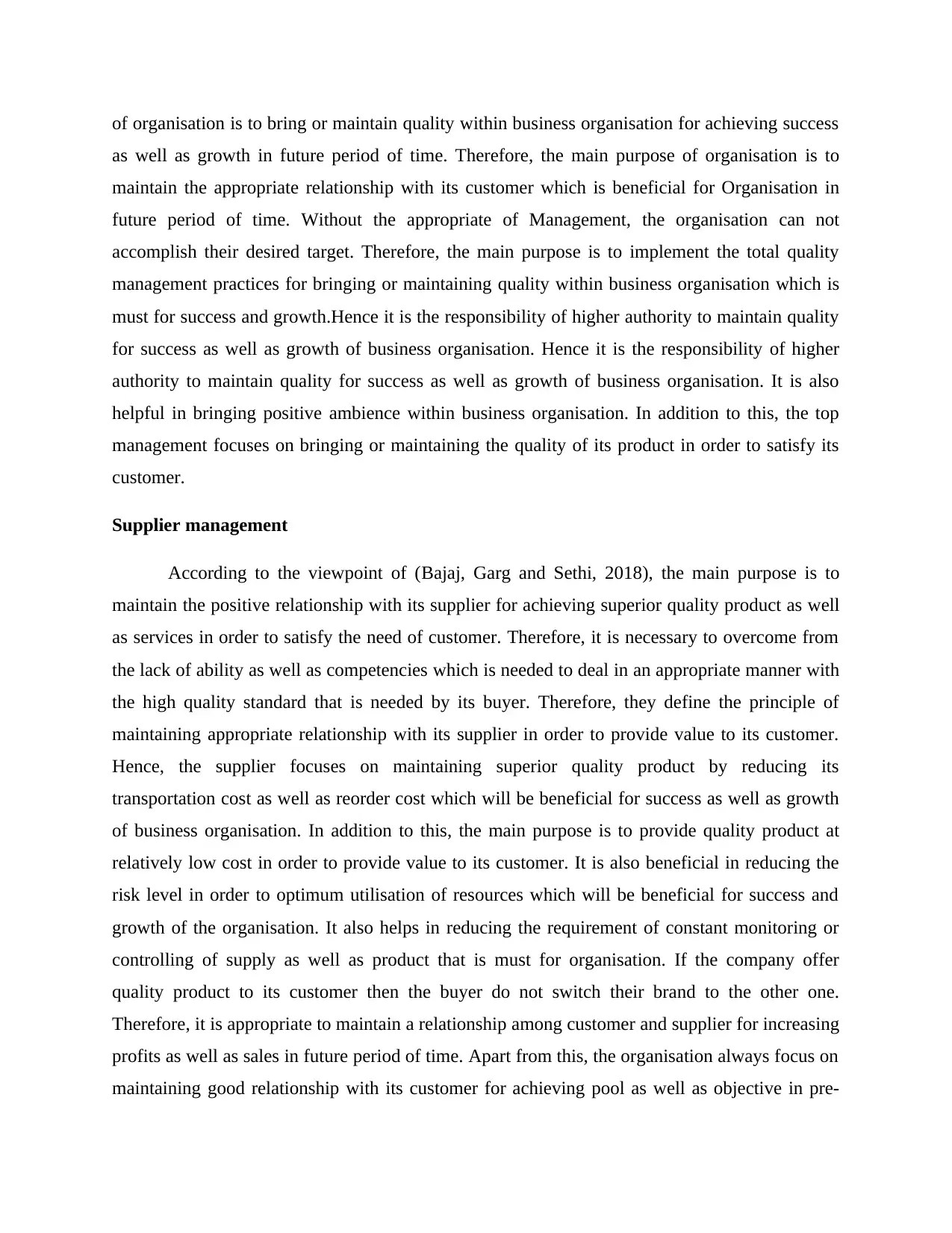
of organisation is to bring or maintain quality within business organisation for achieving success
as well as growth in future period of time. Therefore, the main purpose of organisation is to
maintain the appropriate relationship with its customer which is beneficial for Organisation in
future period of time. Without the appropriate of Management, the organisation can not
accomplish their desired target. Therefore, the main purpose is to implement the total quality
management practices for bringing or maintaining quality within business organisation which is
must for success and growth.Hence it is the responsibility of higher authority to maintain quality
for success as well as growth of business organisation. Hence it is the responsibility of higher
authority to maintain quality for success as well as growth of business organisation. It is also
helpful in bringing positive ambience within business organisation. In addition to this, the top
management focuses on bringing or maintaining the quality of its product in order to satisfy its
customer.
Supplier management
According to the viewpoint of (Bajaj, Garg and Sethi, 2018), the main purpose is to
maintain the positive relationship with its supplier for achieving superior quality product as well
as services in order to satisfy the need of customer. Therefore, it is necessary to overcome from
the lack of ability as well as competencies which is needed to deal in an appropriate manner with
the high quality standard that is needed by its buyer. Therefore, they define the principle of
maintaining appropriate relationship with its supplier in order to provide value to its customer.
Hence, the supplier focuses on maintaining superior quality product by reducing its
transportation cost as well as reorder cost which will be beneficial for success as well as growth
of business organisation. In addition to this, the main purpose is to provide quality product at
relatively low cost in order to provide value to its customer. It is also beneficial in reducing the
risk level in order to optimum utilisation of resources which will be beneficial for success and
growth of the organisation. It also helps in reducing the requirement of constant monitoring or
controlling of supply as well as product that is must for organisation. If the company offer
quality product to its customer then the buyer do not switch their brand to the other one.
Therefore, it is appropriate to maintain a relationship among customer and supplier for increasing
profits as well as sales in future period of time. Apart from this, the organisation always focus on
maintaining good relationship with its customer for achieving pool as well as objective in pre-
as well as growth in future period of time. Therefore, the main purpose of organisation is to
maintain the appropriate relationship with its customer which is beneficial for Organisation in
future period of time. Without the appropriate of Management, the organisation can not
accomplish their desired target. Therefore, the main purpose is to implement the total quality
management practices for bringing or maintaining quality within business organisation which is
must for success and growth.Hence it is the responsibility of higher authority to maintain quality
for success as well as growth of business organisation. Hence it is the responsibility of higher
authority to maintain quality for success as well as growth of business organisation. It is also
helpful in bringing positive ambience within business organisation. In addition to this, the top
management focuses on bringing or maintaining the quality of its product in order to satisfy its
customer.
Supplier management
According to the viewpoint of (Bajaj, Garg and Sethi, 2018), the main purpose is to
maintain the positive relationship with its supplier for achieving superior quality product as well
as services in order to satisfy the need of customer. Therefore, it is necessary to overcome from
the lack of ability as well as competencies which is needed to deal in an appropriate manner with
the high quality standard that is needed by its buyer. Therefore, they define the principle of
maintaining appropriate relationship with its supplier in order to provide value to its customer.
Hence, the supplier focuses on maintaining superior quality product by reducing its
transportation cost as well as reorder cost which will be beneficial for success as well as growth
of business organisation. In addition to this, the main purpose is to provide quality product at
relatively low cost in order to provide value to its customer. It is also beneficial in reducing the
risk level in order to optimum utilisation of resources which will be beneficial for success and
growth of the organisation. It also helps in reducing the requirement of constant monitoring or
controlling of supply as well as product that is must for organisation. If the company offer
quality product to its customer then the buyer do not switch their brand to the other one.
Therefore, it is appropriate to maintain a relationship among customer and supplier for increasing
profits as well as sales in future period of time. Apart from this, the organisation always focus on
maintaining good relationship with its customer for achieving pool as well as objective in pre-
Paraphrase This Document
Need a fresh take? Get an instant paraphrase of this document with our AI Paraphraser
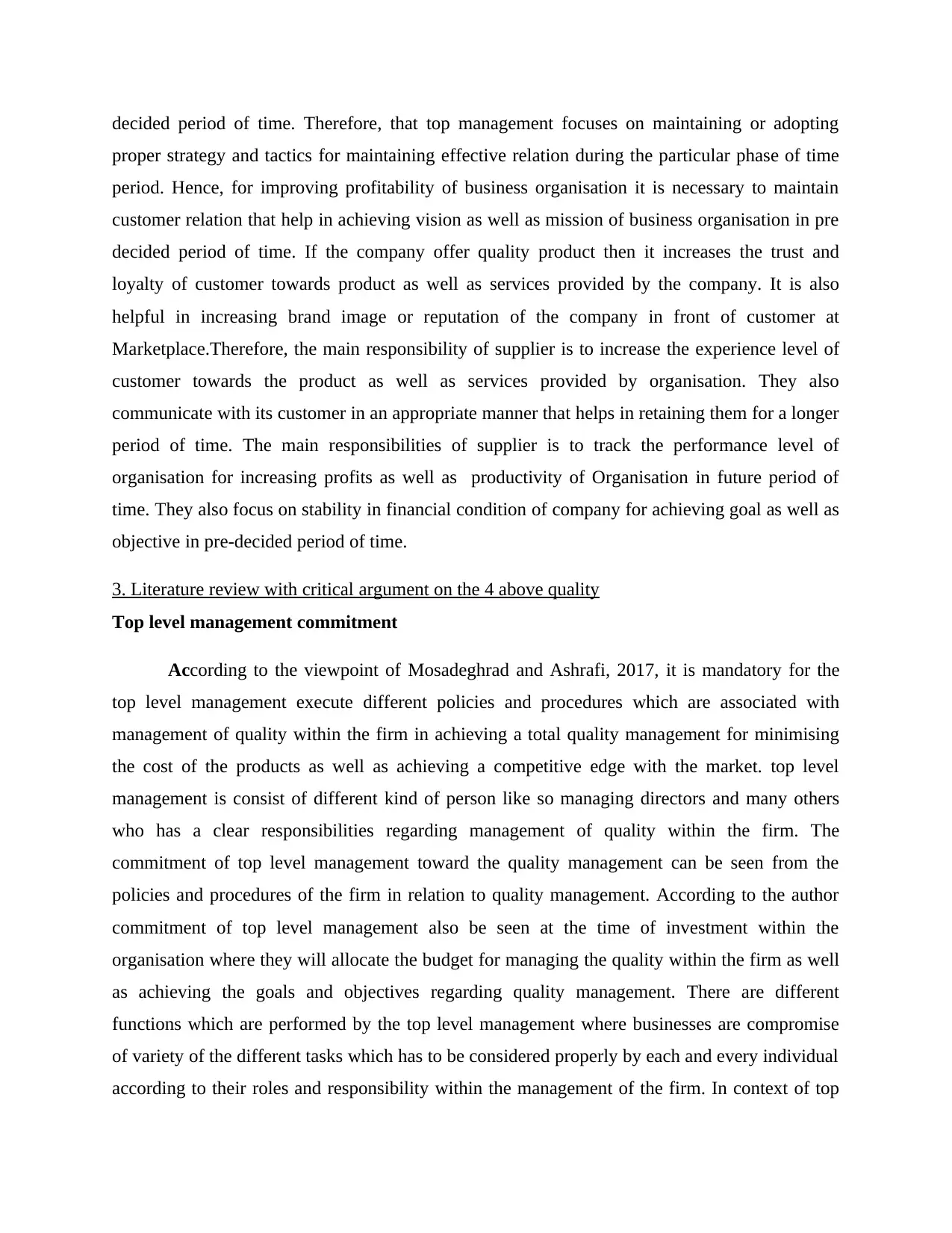
decided period of time. Therefore, that top management focuses on maintaining or adopting
proper strategy and tactics for maintaining effective relation during the particular phase of time
period. Hence, for improving profitability of business organisation it is necessary to maintain
customer relation that help in achieving vision as well as mission of business organisation in pre
decided period of time. If the company offer quality product then it increases the trust and
loyalty of customer towards product as well as services provided by the company. It is also
helpful in increasing brand image or reputation of the company in front of customer at
Marketplace.Therefore, the main responsibility of supplier is to increase the experience level of
customer towards the product as well as services provided by organisation. They also
communicate with its customer in an appropriate manner that helps in retaining them for a longer
period of time. The main responsibilities of supplier is to track the performance level of
organisation for increasing profits as well as productivity of Organisation in future period of
time. They also focus on stability in financial condition of company for achieving goal as well as
objective in pre-decided period of time.
3. Literature review with critical argument on the 4 above quality
Top level management commitment
According to the viewpoint of Mosadeghrad and Ashrafi, 2017, it is mandatory for the
top level management execute different policies and procedures which are associated with
management of quality within the firm in achieving a total quality management for minimising
the cost of the products as well as achieving a competitive edge with the market. top level
management is consist of different kind of person like so managing directors and many others
who has a clear responsibilities regarding management of quality within the firm. The
commitment of top level management toward the quality management can be seen from the
policies and procedures of the firm in relation to quality management. According to the author
commitment of top level management also be seen at the time of investment within the
organisation where they will allocate the budget for managing the quality within the firm as well
as achieving the goals and objectives regarding quality management. There are different
functions which are performed by the top level management where businesses are compromise
of variety of the different tasks which has to be considered properly by each and every individual
according to their roles and responsibility within the management of the firm. In context of top
proper strategy and tactics for maintaining effective relation during the particular phase of time
period. Hence, for improving profitability of business organisation it is necessary to maintain
customer relation that help in achieving vision as well as mission of business organisation in pre
decided period of time. If the company offer quality product then it increases the trust and
loyalty of customer towards product as well as services provided by the company. It is also
helpful in increasing brand image or reputation of the company in front of customer at
Marketplace.Therefore, the main responsibility of supplier is to increase the experience level of
customer towards the product as well as services provided by organisation. They also
communicate with its customer in an appropriate manner that helps in retaining them for a longer
period of time. The main responsibilities of supplier is to track the performance level of
organisation for increasing profits as well as productivity of Organisation in future period of
time. They also focus on stability in financial condition of company for achieving goal as well as
objective in pre-decided period of time.
3. Literature review with critical argument on the 4 above quality
Top level management commitment
According to the viewpoint of Mosadeghrad and Ashrafi, 2017, it is mandatory for the
top level management execute different policies and procedures which are associated with
management of quality within the firm in achieving a total quality management for minimising
the cost of the products as well as achieving a competitive edge with the market. top level
management is consist of different kind of person like so managing directors and many others
who has a clear responsibilities regarding management of quality within the firm. The
commitment of top level management toward the quality management can be seen from the
policies and procedures of the firm in relation to quality management. According to the author
commitment of top level management also be seen at the time of investment within the
organisation where they will allocate the budget for managing the quality within the firm as well
as achieving the goals and objectives regarding quality management. There are different
functions which are performed by the top level management where businesses are compromise
of variety of the different tasks which has to be considered properly by each and every individual
according to their roles and responsibility within the management of the firm. In context of top
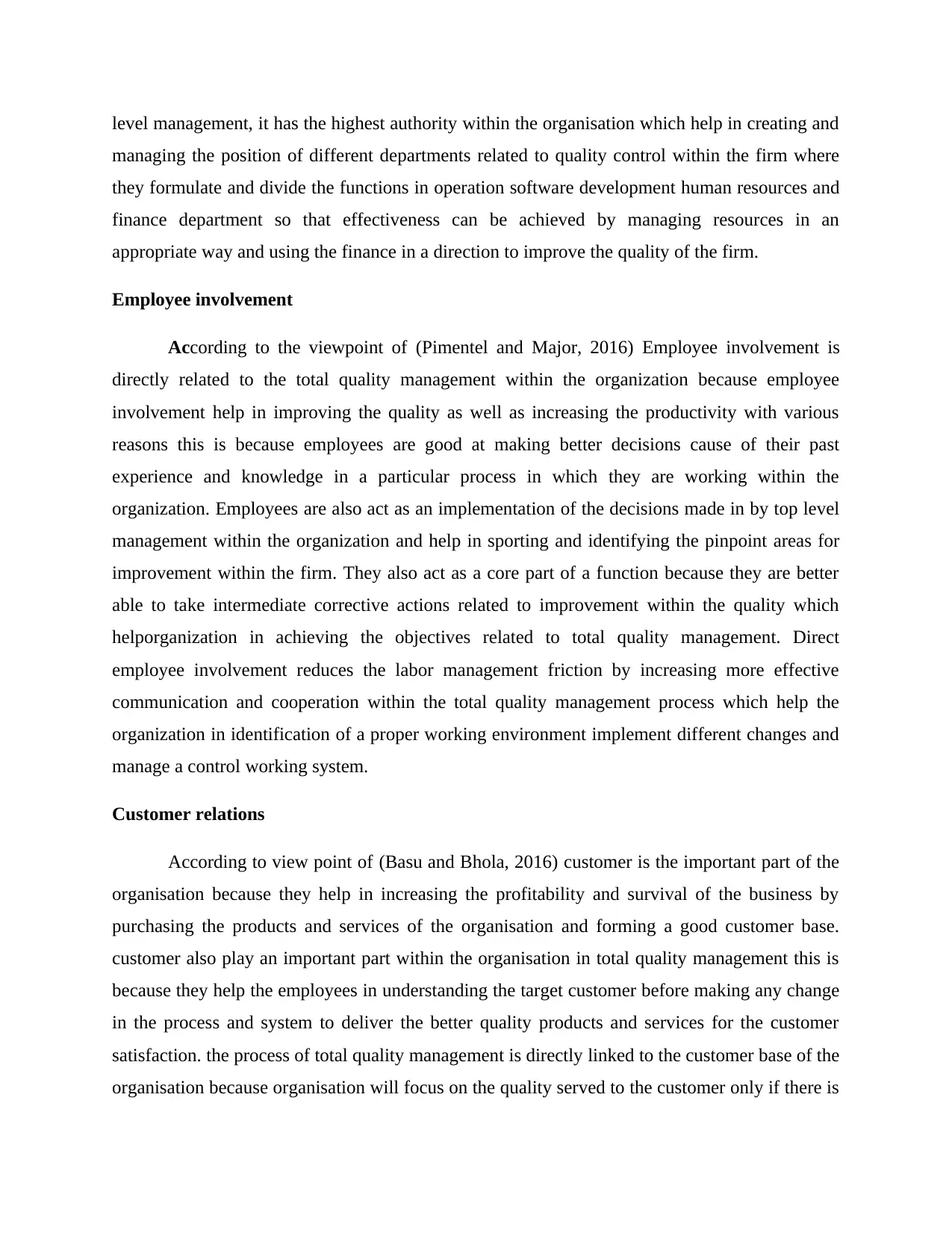
level management, it has the highest authority within the organisation which help in creating and
managing the position of different departments related to quality control within the firm where
they formulate and divide the functions in operation software development human resources and
finance department so that effectiveness can be achieved by managing resources in an
appropriate way and using the finance in a direction to improve the quality of the firm.
Employee involvement
According to the viewpoint of (Pimentel and Major, 2016) Employee involvement is
directly related to the total quality management within the organization because employee
involvement help in improving the quality as well as increasing the productivity with various
reasons this is because employees are good at making better decisions cause of their past
experience and knowledge in a particular process in which they are working within the
organization. Employees are also act as an implementation of the decisions made in by top level
management within the organization and help in sporting and identifying the pinpoint areas for
improvement within the firm. They also act as a core part of a function because they are better
able to take intermediate corrective actions related to improvement within the quality which
helporganization in achieving the objectives related to total quality management. Direct
employee involvement reduces the labor management friction by increasing more effective
communication and cooperation within the total quality management process which help the
organization in identification of a proper working environment implement different changes and
manage a control working system.
Customer relations
According to view point of (Basu and Bhola, 2016) customer is the important part of the
organisation because they help in increasing the profitability and survival of the business by
purchasing the products and services of the organisation and forming a good customer base.
customer also play an important part within the organisation in total quality management this is
because they help the employees in understanding the target customer before making any change
in the process and system to deliver the better quality products and services for the customer
satisfaction. the process of total quality management is directly linked to the customer base of the
organisation because organisation will focus on the quality served to the customer only if there is
managing the position of different departments related to quality control within the firm where
they formulate and divide the functions in operation software development human resources and
finance department so that effectiveness can be achieved by managing resources in an
appropriate way and using the finance in a direction to improve the quality of the firm.
Employee involvement
According to the viewpoint of (Pimentel and Major, 2016) Employee involvement is
directly related to the total quality management within the organization because employee
involvement help in improving the quality as well as increasing the productivity with various
reasons this is because employees are good at making better decisions cause of their past
experience and knowledge in a particular process in which they are working within the
organization. Employees are also act as an implementation of the decisions made in by top level
management within the organization and help in sporting and identifying the pinpoint areas for
improvement within the firm. They also act as a core part of a function because they are better
able to take intermediate corrective actions related to improvement within the quality which
helporganization in achieving the objectives related to total quality management. Direct
employee involvement reduces the labor management friction by increasing more effective
communication and cooperation within the total quality management process which help the
organization in identification of a proper working environment implement different changes and
manage a control working system.
Customer relations
According to view point of (Basu and Bhola, 2016) customer is the important part of the
organisation because they help in increasing the profitability and survival of the business by
purchasing the products and services of the organisation and forming a good customer base.
customer also play an important part within the organisation in total quality management this is
because they help the employees in understanding the target customer before making any change
in the process and system to deliver the better quality products and services for the customer
satisfaction. the process of total quality management is directly linked to the customer base of the
organisation because organisation will focus on the quality served to the customer only if there is
⊘ This is a preview!⊘
Do you want full access?
Subscribe today to unlock all pages.

Trusted by 1+ million students worldwide
1 out of 18
Related Documents
Your All-in-One AI-Powered Toolkit for Academic Success.
+13062052269
info@desklib.com
Available 24*7 on WhatsApp / Email
![[object Object]](/_next/static/media/star-bottom.7253800d.svg)
Unlock your academic potential
Copyright © 2020–2025 A2Z Services. All Rights Reserved. Developed and managed by ZUCOL.





